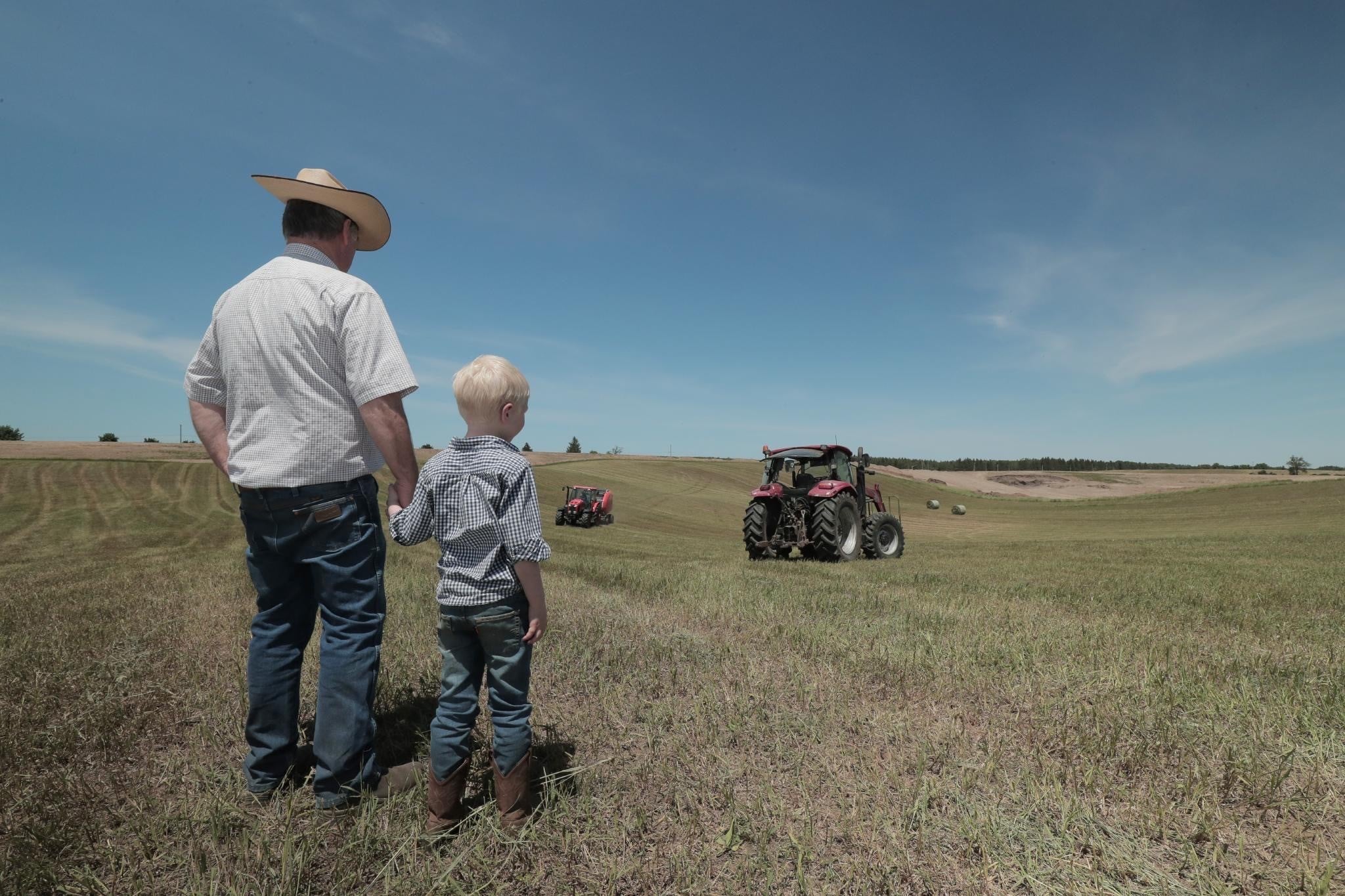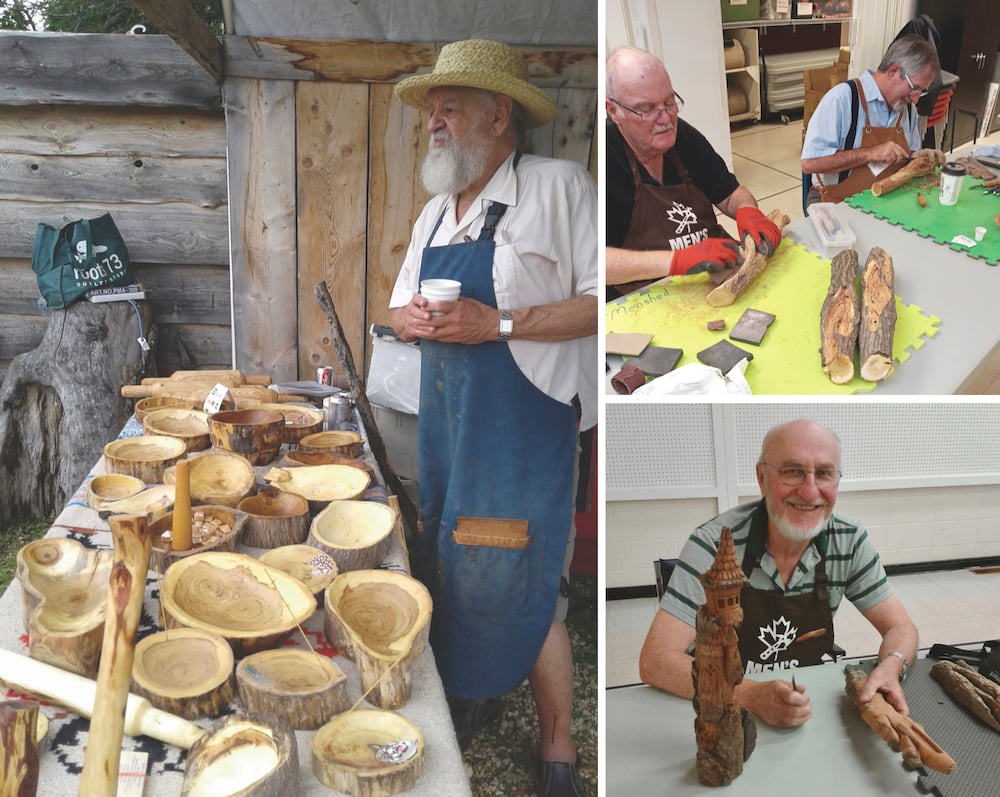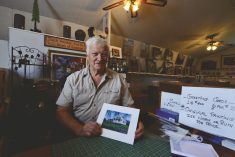John Wiebe raised cattle for 45 years, growing grain with his two brothers at Amaranth, near Lake Manitoba. That part of his life was much like that of any other farmer. But for more than 30 years of it, Wiebe also got in the habit of spending any spare days at Minnedosa, a town of 2,500 an hour and a half to the west, which he was connecting with and increasingly viewing as his second home.
So, 14 years ago when he realized it was time to start making the transition into retirement, perhaps Wiebe didn’t totally feel he was being dragged into it the way many farmers do, but still he knew he would miss the lifestyle and the chance to get on a horse.
Plus, there was that other question that almost all farmers face. What exactly would he do with the endless string of empty days that were heading his way?
Read Also

Where convention and innovation meet
How one Ontario farm is integrating technology into their beef operation.
Wiebe had always liked wood carving. Maybe, he thought, there might be something in that, so a few years ago, when he saw that a Men’s Shed was opening up in Minnedosa and that it would include activities like woodworking, he talked himself into going along to check it out.
Today, it still feels like a discovery. The Men’s Shed would become much more than a place where he can practice his hobby; it’s also a place of companionship and community.
Who knew that for a retired farmer, the key to a successful and satisfying retirement would hinge on making connections with other men in nearly identical situations?
“There is good community there and everyone accepts everybody because we are all on the same page,” Wiebe says. “There’s no big commitment and it’s a place where you are welcomed. If anyone isn’t sure where they are at when they retire, it’s a good place to go because there are always things to do and everyone respects each other’s talents and abilities.”
The Men’s Shed concept is a social initiative that addresses issues of loneliness, isolation, anxiety and depression among retired men, and research studies on Men’s Sheds around the world have confirmed that they can make a huge difference in the lives of many retired men.
Doug Mackie knows this well. Mackie started the first Men’s Shed in Canada in Winnipeg in 2015 and has tirelessly promoted them across Canada.
When asked how he knows that Men’s Sheds work, Mackie launches into an anecdote, as he often does. He describes how he was at a convention in Cold Lake, Alta., last year when a complete stranger approached him and asked if he was the person who had started the Men’s Shed movement in Canada.
“I said ‘yes,’” Mackie says, “And he said, ‘Thank you. You saved my life,’ and then he turned and walked away.”
The thing about men
Men and women retire differently. Women often look forward to retirement because it means they have more time to spend pursuing their interests with family, friends and the social groups or networks they have build up over the years.
Conversely, men tend to define themselves more by their work, which is especially true of farmers for whom the farm is all-consuming as both work and lifestyle. Consequently, when these men retire, they often face challenges, lose their purpose and can end up lonely, isolated and depressed.
“Fundamentally, all of us are social creatures and this sort of social connectiveness is the glue that helps people to feel connected to the community, feel a sense of purpose and feel supported,” says Dr. Corey Mackenzie of the University of Manitoba’s Aging and Mental Health Laboratory, which has been working with the Canadian Men’s Sheds Association to help develop some resources.
“The Men’s Shed movement provides a sense of belonging, community, comradery and connection, and that’s particularly important for men because it is more common for men to define themselves by what they do. When people do that, and that identity is taken away, they struggle more in retirement.”

The point about socializing
It turns out Mackie himself got introduced to the concept of Men’s Sheds by his daughter, who in turn had heard about it during a conversation with an Australian woman at a conference. When she called Mackie and suggested he should start one, he saw it as an opportunity to fill a gap in opportunities for older men in the community.
“When you get a group of men working together, making a diamond willow walking stick, or repairing a lawnmower, or doing an activity together like playing cribbage, they become friends who trust each other,” Mackie says. “They feel safe and comfortable and the men benefit, their families benefit and the community benefits. We call it health by stealth.”
The Men’s Sheds movement started in Australia in 2007 and now has chapters in Ireland, England, Scotland and Canada. It provides communal spaces where men can get together to socialize in a way that is more appropriate for their demographic, which generally means engaging in activities like woodworking projects, cooking, bike repairs, music and yelling at the television during the playoffs.
Mackie received the Manitoba Lieutenant Governor’s Make a Difference Community Award in 2021 for his efforts in bringing Men’s Sheds to Canada, and now there are 65 across the country. Each is unique, taking on the personality and needs of the people involved, which is part of the appeal because there is no set formula or rules.
Everyone is welcome
Men’s Sheds welcome everyone, and sometimes the men’s spouses will come along too, but what’s interesting is that, more often than not, it’s the women in these men’s lives who encourage them to start or attend a Men’s Shed.
“They see the needs of older men; it could be their husband, or father or a man in the community,” Mackie says. “They see a man who has just retired and how quickly they can go downhill because they see them sitting at home, frustrated and they’ll say, why don’t you go somewhere or do something?”
There’s another issue that Men’s Sheds can help address which is the problem of grey divorce — divorce amongst the over-50s — something that is on the rise in Canada.
“Many men, when they retire, try to run the household because they have been running a business all their lives,” Mackie says. “And where can they go? The pub, casino or a hockey game, but none of those things give companionship and camaraderie.”
“There have been 15 or more years of research into exploring Men’s Sheds, and there is growing support for the fact that Men’s Sheds provide the kind of social connection piece, and that this helps protect against some of the difficulties that men encounter in particular in respect to mental health,” Mackenzie says.
A good model for farmers
Although not designed as a social program specifically for farmers, Men’s Sheds offers a good model for rural areas where farmers could shape them to help fill the void that many men feel when they are not actively involved in the day-to-day farm operations any more.
“Men’s Sheds tend to focus on a model where men are building something or working together to do things,” Mackenzie says. “A criticism has been — that it’s built on a masculine foundation of these stereotypes of what men do, and what they like.
“But, that’s probably something that would, for the most part, appeal to farmers, because that’s what the demographic tends to look like.”
Feelings of isolation and a lack of purpose are definitely something that farmers can experience, says Angus Hachowski, president and founder of the Minnedosa Men’s Shed, who knows many retired farmers who have found themselves at loose ends.
The Minnedosa Shed has retired farmers among its members, as well as others from all walks of life including agricultural equipment manufacturers; carpenters; a church minister; men who have worked road, hydro and railroad construction; and even a diamond driller.
“We have lived in town for nearly 50 years and I’ve met people I have never met personally before,” says Hachowski, who grew up on a farm at nearby Strathclair and worked for Morris Equipment building agricultural machinery. “I like the socialization part of it. I like to hear people’s experiences and relate my experiences of my career and my background.”
The shed meets in the replica railroad station at the heart of the town’s Heritage Village, where they find companionship, share stories about their lives and do small woodworking projects for the community plus some basic maintenance jobs at the Village in return for a free roof over their heads.
Benefits for the community
What starts as a group where men find companionship often ends up becoming a social enterprise, and it happens by osmosis; there is no defined mission, vision or statement, the group just evolves into doing what’s needed and its members enjoy every minute.
Many Men’s Sheds do volunteer work or make items for the community or local charitable organizations. In Neepawa, Man., the local Men’s Shed responded to the issue of growing food insecurity in the community by building raised planters along the main street and planting them with vegetables that anyone is welcome to harvest for free. Other Men’s Sheds have built little libraries and bird feeders, and in Kelowna, B.C., the men created memory boxes for a seniors’ home that house photographs and personal mementoe that residents can hang outside the doors of their room.
The Men’s Sheds sometimes partner with other organizations in a community such as a church group, local Lions Club, recreational organization or community centre, but more often they are grassroots.
At the beginning
One of the biggest challenges for a Men’s Shed can be finding a home.
“The hardest part was finding a place to meet,” agrees Hachowski. “In the beginning, you may meet at a coffee shop but eventually, you want to find a private location, and you have to be able to afford it as well, if it’s not free.”
Initially, the Minnedosa shed was subsidized by the local Lions Club that helped out with rental costs, but it now has a regular home at the Heritage Village. Many Men’s Sheds, including Minnedosa’s, do raise funds by selling some of the items they make like bird feeders and by holding spring garage tool-sales.
Men’s Sheds Canada is the umbrella organization that Mackie helped found and organize, and it now offers a $1,000 startup grant for any group wanting to launch a Men’s Shed. It also has a bunch of free online resources — including a toolkit developed in conjunction with the University of Manitoba — with advice about setting up a Men’s Shed. The toolkit can be found at the “Start and running a shed” page at the Men’s Sheds website.
Men’s Sheds in Manitoba and British Columbia can also purchase liability insurance through Men’s Sheds Canada at a reasonable cost, which can be vital for helping to put a roof over their heads.
“They can go to a church or community centre and say although we can’t pay rent, we are covered by a $3 million liability coverage,” Mackie says. “That gives the landlord, or whoever puts a roof over the Men’s Shed some peace of mind.”
How to start
If there are questions about starting a Men’s Shed, the online toolkit available by Googling Men’s Shed Canada can help.
One common question is the obvious one: how do you interest a group of guys in getting involved?
One key is that most men know they find it easier to socialize and communicate when their hands are busy, so promoting the Men’s Shed as a place where they can do woodworking or bicycle repairs or model building, etc., will likely spark more interest.
Also consider including an image of tools as a promotional logo to promote what the shed does.
Men need to feel welcome at the group or they may not come, so encourage them to come with a buddy if they wish, and always introduce everyone when new members come along.
As well, be proactive. Men who are suffering from isolation or depression in the community could find it overwhelming to come on their own, so try and reach out to anyone that you know is in that situation and offer to bring them along.
Men’s Sheds can be anything from quite informal to highly organized, but that’s the beauty of them — they can reflect the needs of the people involved. Some Sheds are independent and some partner with a community organization, which has the added benefit of potentially sharing some space rent-free or at a low cost.
Decide what activities the shed will do, which will likely be guided by the interests, skills and experiences of its members, but remember nobody has to participate in everything. They can simply sit and chat if they prefer.
Some sheds bring in speakers and go on excursions so the options are endless for what the members want to organize.
How much promotion a shed wants to do can vary, and ideas for getting the word out to potential new members include putting posters up on local billboards, providing information to other community organizations, getting featured in the local newspaper or a seniors publication, and attending cultural events.
Also be aware that you may need to be flexible and be prepared for it to take some time and effort to find a meeting location. Some sheds have initially met at a coffee shop, library, community centre, seniors centre or in a private home or garage. Retired farmers may be able to persuade another farmer to provide a corner of a machine shed or outbuilding to meet in but it should ideally involve as little travel time as possible to get there.
Although it’s ideal to find a free space to meet, a shed may need to raise funds for a few startup costs like rent or basic woodworking supplies. The shed can raise money in a number of ways: through member donations or membership fees, selling items it makes, doing work in the community in return for donations, or charging a small fee for repairing or refurbishing items like bicycles or lawnmowers.
Although all Men’s Sheds members are considered equal, the group will need leadership to post information about meeting dates and activities, which may involve posting to social media or via email. This leadership role may evolve and rotate as the group takes shape.
As always, it’s also a good idea to visit other Men’s Sheds to see how they work and get ideas, or check out their websites on Men’s Sheds Canada.
















